
Download the PDF of this article
Intergenerational practice is when different generations mix together and take part in shared activities and experiences. Thousands of care homes and older people’s housing schemes across the UK are now engaging in some kind of regular weekly or fortnightly activity with nurseries, childminders, schools and parents and toddler groups, according to research undertaken by consultancy United for All Ages (UfAA).
Some nurseries are located adjacent to care homes, such as Busy Bees nursery in Chichester, where children regularly visit Anchor care homes for planned weekly activities. Others are co-located on the same site, such as Little Wrens Nursery in Nottinghamshire and London-based Apples and Honey Nightingale, the UK’s first care home nursery.
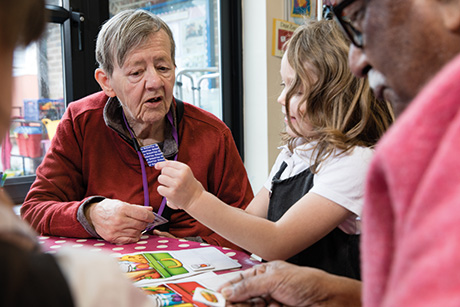
Innovative projects in the pipeline include the £12 million intergenerational development at Worthington Lake in Wigan by care home operator Millennium Care, which will include a nursery, assisted-living flats, a care home and dementia unit, along with community facilities.
And in Torbay, a DfE grant has been secured to open a room in a local care home, which will be operated by two different childminders each day of the week – Torbay local authority is a leading example in using its forums to bring together adult care and childcare, and 20 care homes are already visited weekly by childminders and pre-schools.
Stephen Burke, director of UfAA, says, ‘We estimate that there are now 40 sites that have a centre for all ages. However, one of our key recommendations in our recently published report, The Next Generation, is to extend this number up to 500 by 2023.’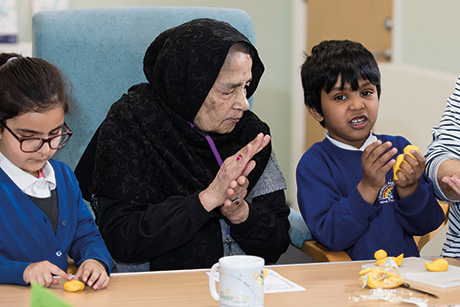
MIXING MATTERS
Despite there being a ‘real head of steam’ in developing intergenerational practice in the early years sector, helped by the media coverage in Channel 4’s Old People’s Home for 4 Year Olds documentary, the UK is ‘still catching up’ with international counterparts in the USA and particularly Japan, where the ethos is embedded into society, Mr Burke explains.
‘The beauty is that everything that’s being done here is grassroots-driven,’ he adds. ‘It’s not policy or Government funding that is driving this. People are doing it because they think it’s the right thing to do and they recognise the benefits for a range of different ages. We are also now at the point where we have our own exemplars in this country.’
Anxiety, loneliness and social mobility are just some of the issues that can be alleviated when older adults and children mix more often. However, as well as the benefits for older people, UfAA’s The Next Generationdocument reports that bringing young and older people together can boost children’s well-being, language use and acquisition, their social interaction and change attitudes towards ageing.
According to the report, children involved in intergenerational projects have better reading and communication skills, are more ‘school-ready’ and show more empathy.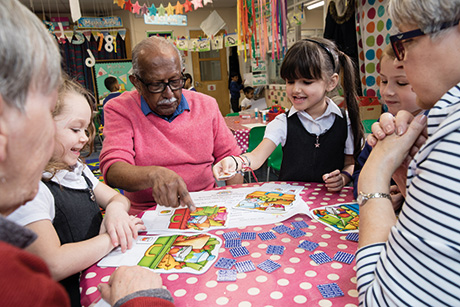
CASE STUDIES
Curriculum links
Setting: Downshall Primary School, Ilford, Essex
Project: Bringing Together, Learning Together, Growing Together brings together 15 older adults from the local community to work with Reception-aged children.
Downshall Primary School in Ilford, Essex hosts a day centre where 15 older adults suffering from early dementia, isolation and loneliness visit the school three times a week to take part in planned curriculum activities and social interactions with a group of 18 targeted focus children.
The older adult visitors, who have been referred by North East London Foundation Trust (NELFT), have their own dedicated social lounge where children can visit and take part in various activities – puzzles, cutting and sticking, board games, memory games and artwork. They also spend three 20-minute sessions with six targeted four- and five-year-olds in each of the three Reception classes, taking part in activities that fit within the early years curriculum.
The project, which was launched by consultant psychiatrist Dr David Hinchcliffe of the Redbridge Community Health Team in Ilford in November 2017, is proving to be mutually beneficial for both adults and children. While the older adults are benefiting from enhanced emotional well-being, the target children are showing a strong improvement in their social development and academic performances.
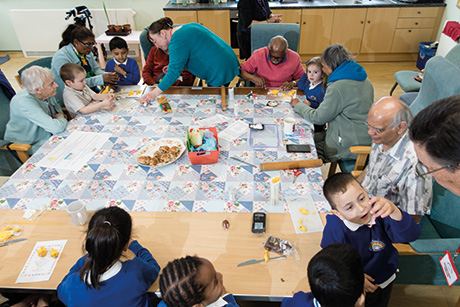
Head of early years Maria Zatat co-ordinates the educational arm of the project and liaises with leaders of the local Health and Social Services team, as well as volunteers from Age UK and international charity Lions Club, who together jointly run the project.
She says, ‘Our biggest success story is having a child who was an elective mute from September, but by January he started whispering and by the end of April, he blossomed and you could have a normal conversation with him. He started off talking just to the older adults and then to the social worker and the volunteers and finally the teacher, and he then went on to build friendships.’
Eighty-nine per cent of children attending the school have English as an additional language and last year 60 per cent of children started Reception significantly below the age-related expectations – especially in communication and language (C&L) and personal, social and emotional development (PSED).
‘All of these factors,’ explains Ms Zatat, ‘put them at a disadvantage when it comes to settling in; being able to bond with peers and teachers and being able to access the early years curriculum.
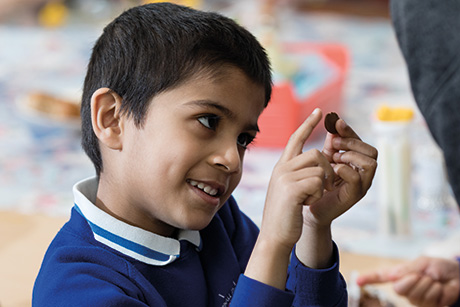
‘Because these very important prerequisite skills were missing in these children, we wanted to measure the impact of how interacting with the older adults would help them gain the same progress as their peers and whether these children could reach the expected level – or make personal progress towards – these expectations in comparison to the children not in the programme.’
The data shows that the target children have not only outperformed their non-participating peers when it comes to the progress they have made in C&L, PSED and reading but they have also exceeded their targets.
Ms Zatat says, ‘Every half term we enter children’s performance in each area in our Target Tracker system and we look at the progress over time. Within the key categories that we are measuring – C&L and PSED – there are sub-categories; for example, making relationships. This covers managing feelings and behaviour, and looks at how resilient the children are, how they deal with failure and how they can find comfort in older adults to verbally express themselves.
‘The expected progress that children are required to make, on average, is six learning steps across the year. Our focus children have made 9.8 steps progress in C&L and 10.1 in making relationships, which is astounding – and undoubtedly down to their interaction with the older adults.
‘Parallel to that, they have made 9.1 steps progress in reading, just through engaging with books with the older adults three days a week.
‘Compared with their non-participating peers, we found that the focus children made much more progress in the Prime areas. In Speaking, for example, they made 9.8 steps progress compared to 8.’
Head teacher Ian Bennett says, ‘The project has been such a success that we are working with the NHS Foundation Trust and Redbridge Council to establish a network to develop provision within schools in North East London.’
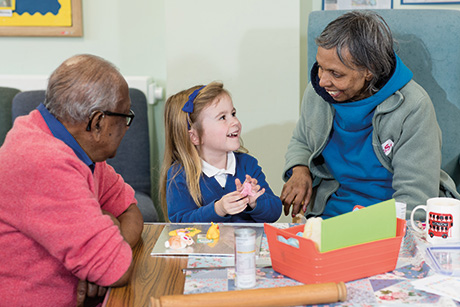
More information
www.downshallprimary.co.uk/redbridge/primary/downshall
Life stories
Setting: Collaton St Mary Pre-school, a 50-place pre-school providing sessional care
Care home provision: Whitley Court, owned and managed by Sanctuary Retirement Living
Six four-year-olds have brought such joy to a group of residents at this retirement community that one of the ladies has taken on the role of lead storyteller and a gentleman is ‘flourishing’ as a result of the visits.
Pre-school manager Julia Yarrell, who set up the partnership with support from Torbay Early Years team, says the initiative was originally a five-week pilot. However, the results have been so positive that they are going to continue funding the minibus to transport the children on the 15-minute journey from the setting in Paignton to the retirement complex, which comprises 62 self-contained apartments.
‘Week on week the bonds are getting stronger,’ she says. ‘The children are talking about their new friends at home and are making suggestions of what to do with them during the sessions. Last week, a little boy brought in a train set and he spent some wonderful one-to-one time with a gentleman who has a keen interest in trains. We also brought in a doll’s house for some of the children to engage in small-world play.
‘In past weeks, we’ve done parachute games, listened to music and movement CDs, set out playdough on long tables for children to play with the tenants and listened to Elvis. There’s always a story – Wonky Donkey is a favourite – and it’s wonderful to see the chairman of the tenant’s association, a resident herself, begin to take ownership of the visit by leading the storytelling and coming up with ideas for future sessions.
‘One week the children wanted to take in their learning journals to show them photos of what they do at pre-school. The tenants loved finding out a bit more about their lives, so we thought it might be nice for them to share a bit about their own lives one week, perhaps some photos of their family or their wedding day, for example.
‘Back at the setting we have a noticeboard with photos of the nine main residents who attend each week and their names. We have also made a similar board for the service which sits in the communal room that we visit each week. It’s such a wonderful feeling to give something back to the community – and to hear that one gentleman who has no family was so delighted to receive a hand-made card from the children that he spent weeks talking about it and showing it to everyone is heart-warming.
‘We have invited the tenants to come for an afternoon tea party at the pre-school after Easter. And our long-term aim is to bring parents along to the visits in the hope that rapports will be built and they will eventually visit the tenants with the children in their own time.’
More information
www.collatonstmarypreschool.co.uk
www.sanctuary-retirement-living.co.uk/whitley-court
Storytelling and dramatic play
Organisation: Debutots Intergenerational Project:Joining Generations with Imagination (www.debutots.co.uk)
Eldercare providers: Hourly sessions take place in 13 care homes across Worcestershire where up to 12 children from ten local pre-schools and nurseries visit the settings on a fortnightly basis to take part in the sessions.
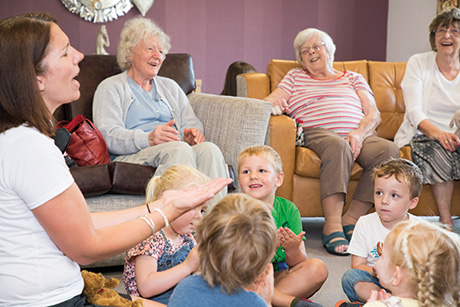
This project is the brainchild of Kirsten Reeves, a Debutots franchisee in Worcestershire, whose venture has become such a success that it is being rolled out to other Debutots franchisee owners across the UK.
She says, ‘I’d been running Debutots interactive story and drama sessions for local families and in nursery settings for four years, but a year ago I successfully piloted my first session in a local care home after months of research. The response from the local community has been astonishing and most settings I approach have been very keen to be on board.
‘I now run sessions in 13 care homes with children from ten nurseries and pre-schools visiting the homes closest to them. The biggest challenge, in some cases, is getting the children from the nursery to the care home, with some having to pay for a coach, which can be costly.’
The benefits, however, have become clear. ‘Regularity is key,’ explains Mrs Reeves, ‘so that relationships can blossom. Stories are so powerful and are the ideal common ground to bring generations together.
‘Some of the children become attached to a particular resident and it’s wonderful to see the room light up when they come in. One little girl has developed a special bond with a lady and she runs up to hug her when she arrives. One day, the lady wasn’t there and the child kept looking for her. It turns out she was having her hair done, so she went to see her afterwards. She even visits her with her parents sometimes and makes cards and drawings for her.
‘The atmosphere is so special; I’d like to bottle it. There are so many occasions where I’ve been teetering on the edge of tears with how powerful and beautiful the interactions are.
‘Employees have reported that residents who were reluctant to come out of their rooms, because they didn’t want to be part of the home’s community, now don’t want to miss our interactive stories because they get so much out of the session. Children are learning that age isn’t a barrier to friendship and elderly people are not scary.’
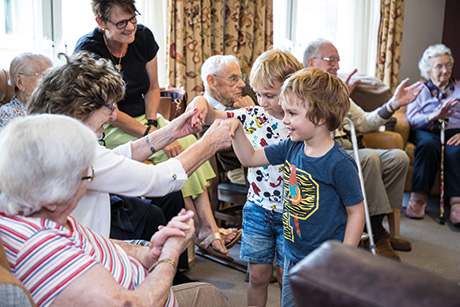
The main session involves a unique blend of interactive storytelling and dramatic play. The basis for each session is an original Debutots story such as ‘Can’t you see we’ve polluted the sea’, which is about a dolphin whose sea is full of rubbish.
Mrs Reeves says, ‘The children sit in a circle surrounded by the residents and they clamber under a parachute pretending to be dolphins, while the residents make small wave-like movements with it. We put on some 1940s and 1950s music, which allows opportunities for reminiscence and singing along.’
As well as the benefits the children gain from being involved in intergenerational sessions, they are also developing their language and communication skills through the tailored Debutots classes.
The sessions are also currently free for nurseries and pre-schools across the UK, and the costs are covered by the care home.
CASE STUDY: Cross-stitch connections
Setting: Everton Nursery School and Family Centre
Project: Monthly Intergenerational Sustainable Skills Café with ten children, their parents and ten older members of the community
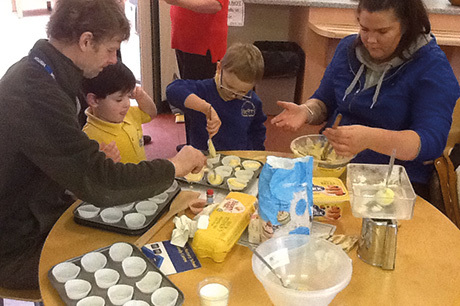
A making-and-mending café which teaches young children and their parents the lost art of sewing, knitting, baking and how to fix a bike puncture is bringing together the community at a setting in Liverpool.
Each month, parents and grandparents meet at Everton Nursery School and Family Centre where they spend two hours interacting with families and demonstrating a traditional skillset, such as sewing, knitting and how to make traditional meals, such as fish pie.
Head teacher Dr Lesley Curtis developed the idea with her colleague Diane Boyd – a senior lecturer in early years at Liverpool John Moores University (LJMU) – in January last year and has since secured funding from Liverpool City Council’s Mayor’s Fund to continue to run the café.
She says, ‘The idea was born out of the desire to bring the generations together in a safe, secure setting and give the older people ownership of passing on the lost arts and skills of early childhood, such as darning, weaving and mending trouser hems, to reflect a more traditional and sustainable society.’
The project – which was the first to trial an initiative by LJMU – has since been rolled out in a similar format to four more Children’s Centres in Liverpool. Dr Curtis explains, ‘Each month we have a different theme; for example, for Harry and Meghan’s wedding we made crowns and flags and invited the group to a tea party that we held in the nursery garden. We’ve added skills like mending bikes and fixing punctures, which involves more dads and grandads.

‘We have threading and knitting sessions, which helps children’s hand-eye co-ordination and fine motor development. It’s a great opportunity for parents to learn new skills – and the staff are also very keen to be involved – and the children mimic these skills and are extremely focused with their learning.’
As for the older generation, they are getting out and socialising and ‘feel useful’, Dr Curtis adds. One grandad has had such a confidence boost that he is now volunteering one day a week at the nursery school.
Families are also learning about young children’s capabilities. The educational content and the role of the adult is at the forefront of sessions.
‘We are essentially helping to nurture the parent and grandparents and other members of the community – so we encourage them to weigh and count the ingredients together, for example,’ Dr Curtis explains. ‘This way, [they] gain an insight into what the potential of a three- and four-year-old is and how, when they go into Reception, they will be at a higher level because they’ve engaged in such activities.’
More information
www.evertonnurseryschoolandfamilycentre.org
For more details on the four other Intergenerational Sustainable Skills Cafés, visit http://bit.ly/2KVnWp5
CASE STUDY: Family affair
Setting: Little Wrens Nursery, with 30 places
Eldercare provider: Wren Hall Nursing Home (www.wrenhall.com), with 52 places
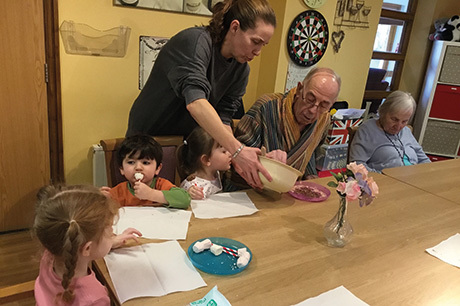
Residents at Wren Hall Nursing Home in Nottinghamshire are greeted each morning by a smiling group of 12 children who pop in to say good morning and shake hands on the way to the garden to feed the chickens and guinea pigs. ‘It’s part of our morning routine and residents’ faces light up,’ explains nursery manager Jane Lister.
The family-run specialist dementia care home is co-located with Little Wrens Nursery, which opened in March 2018 to cater for staff who struggled to get childcare for their shifts. Visits to the nursing home take place throughout the day. Some are planned, for example when joint cookery sessions take place, and others are more spontaneous.
‘We don’t go during mealtimes,’ explains Ms Lister. ‘We usually go each day around 11am with a small group of five children and we do an organised activity. If we are cooking, the catering staff set up tables and provide aprons and the children and residents usually cut up vegetables for a salad, or on Valentine’s day we made love heart lollypops.
‘We have painting and drawing sessions in the day centre, where the children sit with the ladies and gents and paint pictures of natural landscapes. The day centre often invites us over to listen to the entertainment. Sometimes the ladies and gents come and sit outside to watch us play in the gardens, accompanied by their carer. It’s like one big family. It’s very special.
‘The children have a lot of respect for their elders and they feel comforted by and comfortable with them. One gentleman has a strong attachment to a little boy and every time he sees him, he gets up and gives him a high-five. The children are asked what they’d like to do with the ladies and gents and they like to take pictures over to draw with them – and some are even energetic enough to play football with them!’
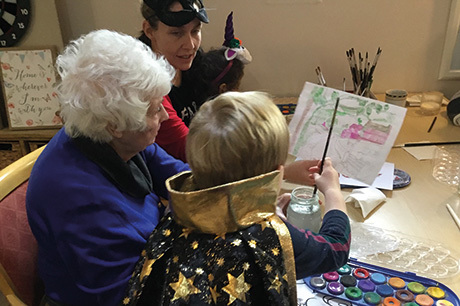
More information
https://littlewrensnursery.co.uk
MORE INFORMATION
Intergenerational care is thought to have started in the 1970s, when Shimada Masaharu merged a nursery school and care home in Tokyo. As a result, more intergenerational care facilities opened in Japan, Singapore and the USA, with many applauding the benefits of the practice. See: https://bit.ly/2JXPmdg
For information about the development of intergenerational learning in the UK, visit: http://unitedforallages.com
Mixing Matters, a report by United for All Ages on intergenerational co-location in the UK, is at: https://docs.wixstatic.com/ugd/98d289_8e6302f601be4e70942a1d3909a7d2bd.pdf
In 2017, Lorraine George, childminding development worker in the Early Years Advisory Team at Torbay Council, received a Winston Churchill Fellowship award to research intergenerational co-location in the US. Her report, Starting Young: Lifelong lessons from intergenerational care and learning, is at: https://bit.ly/2WDgKyT
See also her article at: www.nurseryworld.co.uk/nursery-world/feature/1163999/eyfs-best-practice-all-about-intergenerational-co-location
WHAT'S NEXT?
UfAA is working with childcare providers and eldercare providers to audit their current intergenerational activities and identify opportunities. They are also undertaking feasibility studies on co-locating childcare alongside eldercare and will be hosting regional workshops to support these developments. See www.unitedforallages.com
There are two Parliamentary inquiries due to report shortly: the All-Party Parliamentary Group on Social Integration is conducting an inquiry into intergenerational connection, and a House of Lords select committee is looking into intergenerational fairness and provision. A social care green paper is also expected, which it is hoped will endorse intergenerational models.
Secretary of State for Health and Social Care, Matt Hancock, has already given co-located care his blessing. See: https://bit.ly/2I5YF8r









